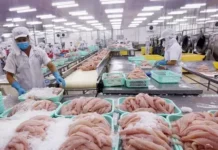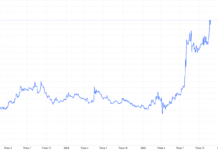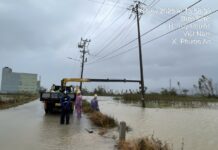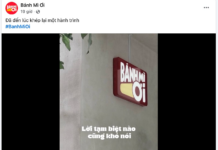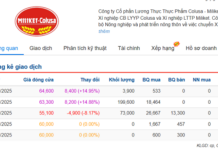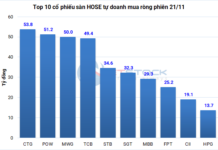
Hoang Thi Huong (left) and her accomplices. Photo: BCA.
As previously reported by Tien Phong, on October 4th, following an investigation and based on the collected evidence, the Office of the Criminal Investigation Agency under the Ministry of Public Security initiated legal proceedings and charged six individuals, including Hoang Thi Huong, the owner of Hoang Huong Business Household (Hoang Huong Ecosystem), with “Violating accounting regulations, causing serious consequences” under Article 221, Clause 3 of the Penal Code.
Initially, the investigation revealed that to conceal revenue and reduce tax liabilities for 18 companies under her control, Hoang Thi Huong directed and collaborated with her accomplices to devise a scheme. They used the personal identification documents of employees and relatives to establish 25 business households, recruited individuals to act as sellers, and hired shipping companies to create an “ecosystem.” The purpose was to transfer revenue from the companies to these business households and individuals. Additionally, Hoang Thi Huong instructed the exclusion of actual revenue from the companies’ accounting records. In reality, these business households and individuals did not engage in any business activities.
Specifically, the suspects transferred a portion of the actual revenue from the 18 companies to 25 business households and 33 individuals, totaling over 2,069 billion VND. This resulted in an estimated loss of value-added tax (VAT) due to the difference between the two business types, amounting to more than 144.8 billion VND. In 2024 and 2025 alone, the VAT loss to the state budget exceeded 141.9 billion VND.
Furthermore, the unrecorded revenue of the 18 companies within the Hoang Huong Ecosystem totaled over 1,750 billion VND, causing an estimated VAT loss of more than 139.9 billion VND. Thus, the initial investigation suggests a total loss of over 284.7 billion VND.
Signs of a Sophisticated Underground Economy
Based on the initial case information, Dr. Ngo Ngoc Diem, a legal expert, opined that the actions of the defendants go beyond mere “Violations of accounting regulations causing serious consequences.” They exhibit signs of a sophisticated underground economic organization, operating across platforms with a multi-layered legal entity structure to legitimize funds and evade taxes.
Under the law, establishing “backyard companies,” transfer pricing, or using falsified accounting records not only constitutes an aggravating factor in the crime of “Violating accounting regulations causing serious consequences” (Article 221 of the Penal Code) but also potentially constitutes the separate crime of “Tax evasion” (Article 200 of the Penal Code), provided there is evidence of intentional revenue concealment, false expense declarations, or fictitious documentation.
Specifically, according to Article 200 of the 2015 Penal Code, “Tax evasion” is defined as the failure to declare, false declaration, use of illegal invoices, or other acts aimed at evading tax payments on a large scale. Dr. Diem noted that if the investigation uncovers evidence of document destruction or accounting data manipulation to evade tax obligations, the legal consequences for the defendants will be particularly severe.
Notably, during the investigation, if it is found that funds obtained through illegal activities are further laundered through real estate investments or transferred via international accounts to legitimize their origins, this chain of actions could be additionally examined under the charge of “Money laundering” as per Article 324 of the 2015 Penal Code.
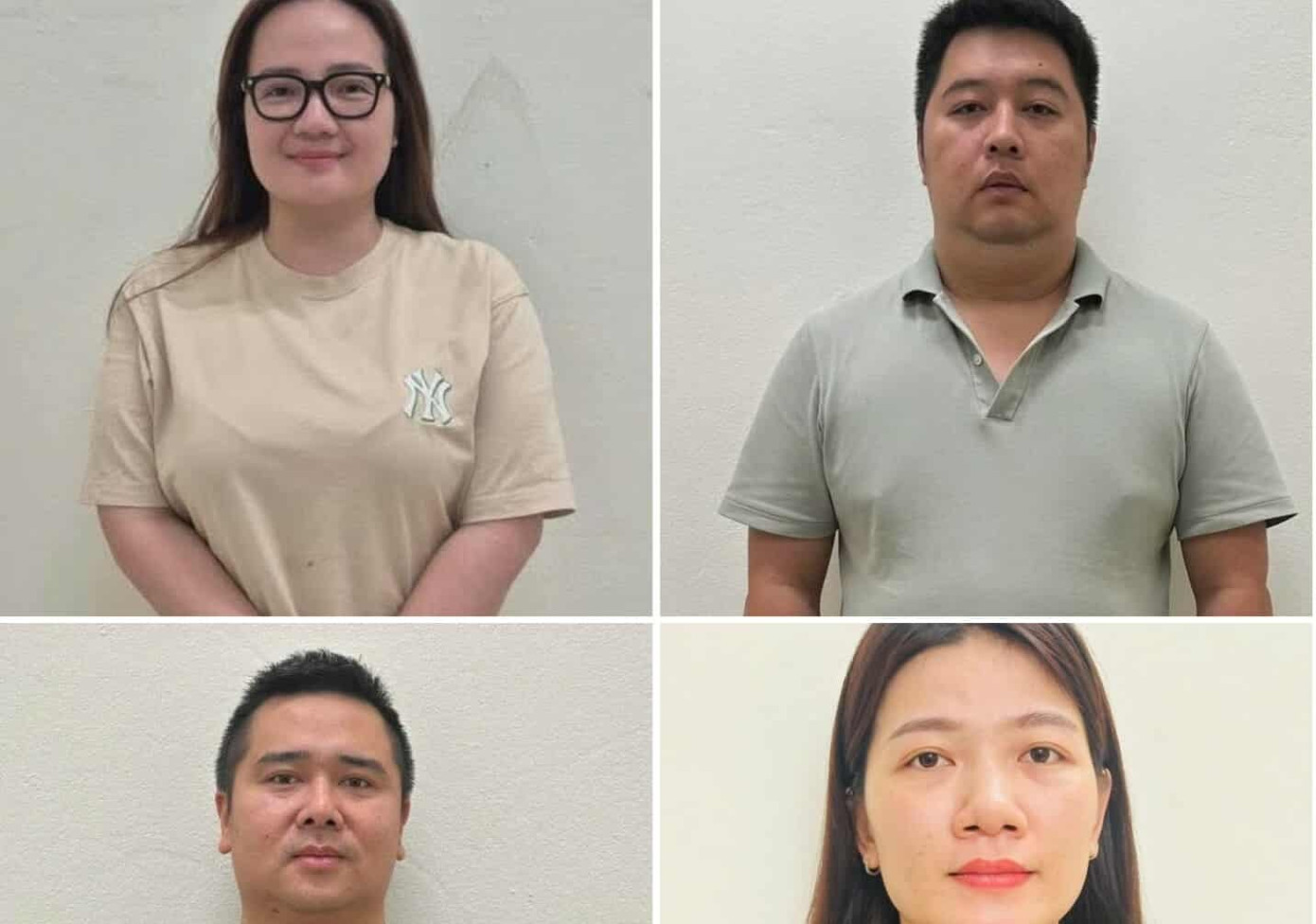
The defendants in the case.
If the investigated individuals are found to have established and managed multiple companies, branches, and social media accounts for online business operations, they may fully meet the criteria for the aggravating circumstances of “organized crime” and “professional crime” under Articles 17 and 52 of the Penal Code.
“The division of roles, remote management, and technology-based directives indicate a 4.0 economic crime model, where the mastermind can coordinate dozens of links without direct involvement,” emphasized Dr. Diem.
Attorney Bui Phan Anh added, “The leader who ‘directs remotely’ and uses others as legal representatives still bears criminal responsibility as the organizer and mastermind. According to Clause 3, Article 17 of the Penal Code, the organizer is liable for all consequences of the crime, even if they do not directly commit the illegal acts.”
Under Articles 126 and 129 of the 2015 Criminal Procedure Code, investigative agencies are authorized to seize assets and freeze accounts from the initial stages of the case if there is evidence linking those assets to the criminal activities. This ensures the recovery of assets, compensation for state losses, and future enforcement of judgments.
Simultaneously, tax authorities may issue tax assessment decisions as soon as there is sufficient evidence of tax evasion, without waiting for the outcome of the criminal proceedings.
Market Distortion and Unfair Competition
From a state management perspective, the Hoang Huong case exposes significant gaps in controlling e-commerce taxes, especially for businesses operating primarily through social media platforms.
Attorney Bui Phan Anh identified three key issues: the lack of a mandatory real-time data reconciliation mechanism between tax authorities, banks, and e-commerce platforms; the difficulty in monitoring off-platform transactions, particularly live-stream sales with personal account payments; and limited international cooperation with cross-border platforms like Facebook, Google, and TikTok.
According to the 2019 Tax Administration Law and Decree 126/2020/ND-CP, these platforms are obligated to provide seller identification data, revenue, and transaction history upon request from tax authorities. However, the enforcement mechanism remains weak and lacks binding force.
Experts suggest that Vietnam needs to establish a more robust digital tax and financial management framework in light of the Hoang Huong case.

Hoang Huong before her arrest.
Dr. Ngo Ngoc Diem analyzed that from an economic standpoint, a company evading taxes and selling products at lower prices due to cost fraud constitutes unfair competition under the 2018 Competition Law. This distorts market pricing principles and severely harms law-abiding businesses.
“The market becomes skewed when profits are based on fraud rather than productivity or innovation. This misdirects societal capital and labor into flawed models, creating a parallel underground economy,” stated Dr. Diem.
Dr. Diem further noted that live-stream selling creates a “legal gray area,” where sellers can easily exaggerate product benefits, deceive consumers, or sell counterfeit or substandard goods.
Under the 2023 Consumer Rights Protection Law, “providing false or incomplete information about goods or services” is considered consumer deception and can result in administrative penalties or criminal prosecution. However, the challenges in gathering evidence from live-stream videos (often deleted) and the slow complaint resolution process weaken consumer protection mechanisms.
Preventing Abuse of Tax Debt Cancellation Policies
To address the persistent issue of unrecoverable tax arrears, the Ministry of Finance has proposed writing off tax debts over 10 years old while expanding travel bans for businesses with outstanding tax liabilities. However, experts caution that tax debt forgiveness requires careful consideration.
The Hoàng Hường Scandal: Exaggerated Claims of Miracle Cures, Flaunted Wealth, and Arrogant Online Behavior
Over the past few years, the name Hoàng Hường has ignited social media. From her high-profile endorsements of health supplements to her lavish displays of wealth and luxury living, she captivated audiences with an image of opulence. However, this glittering facade was swiftly dismantled when authorities revealed significant financial irregularities, exposing the truth behind the glamour.


